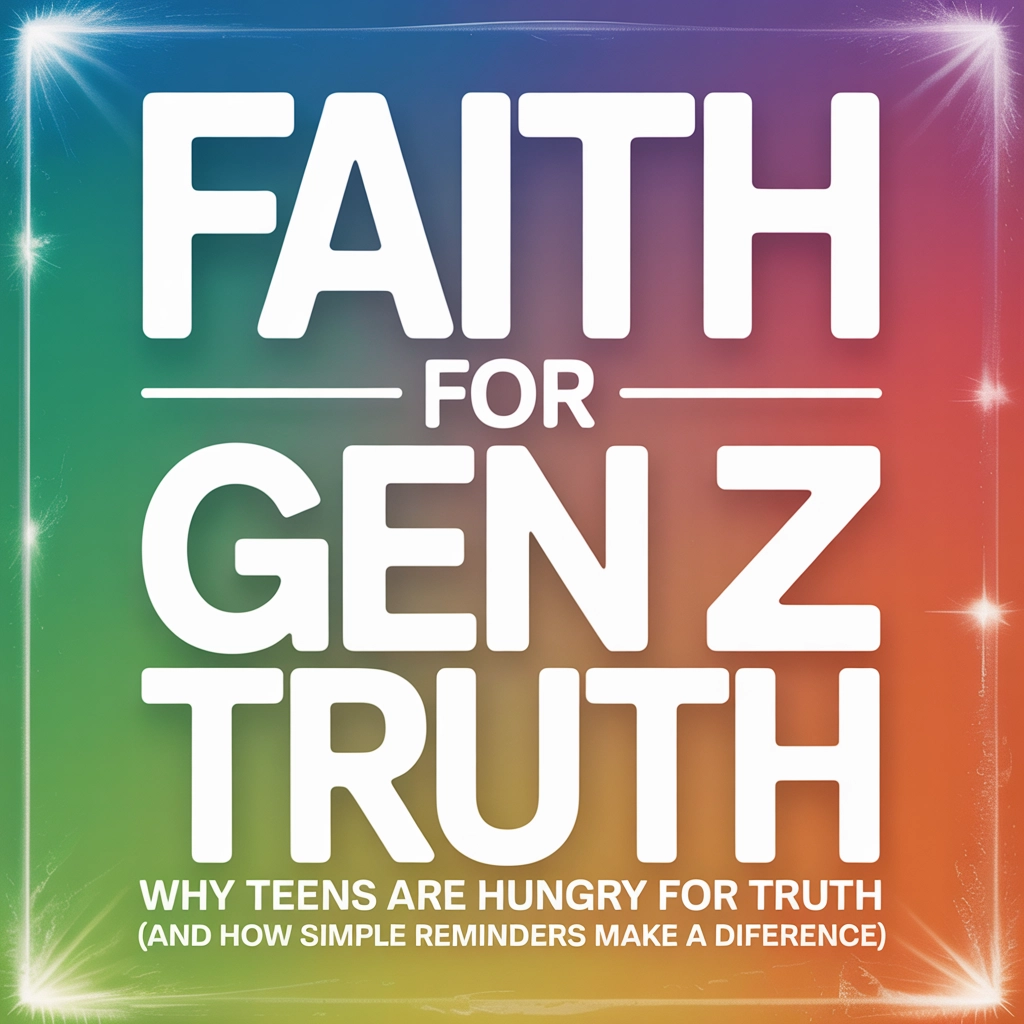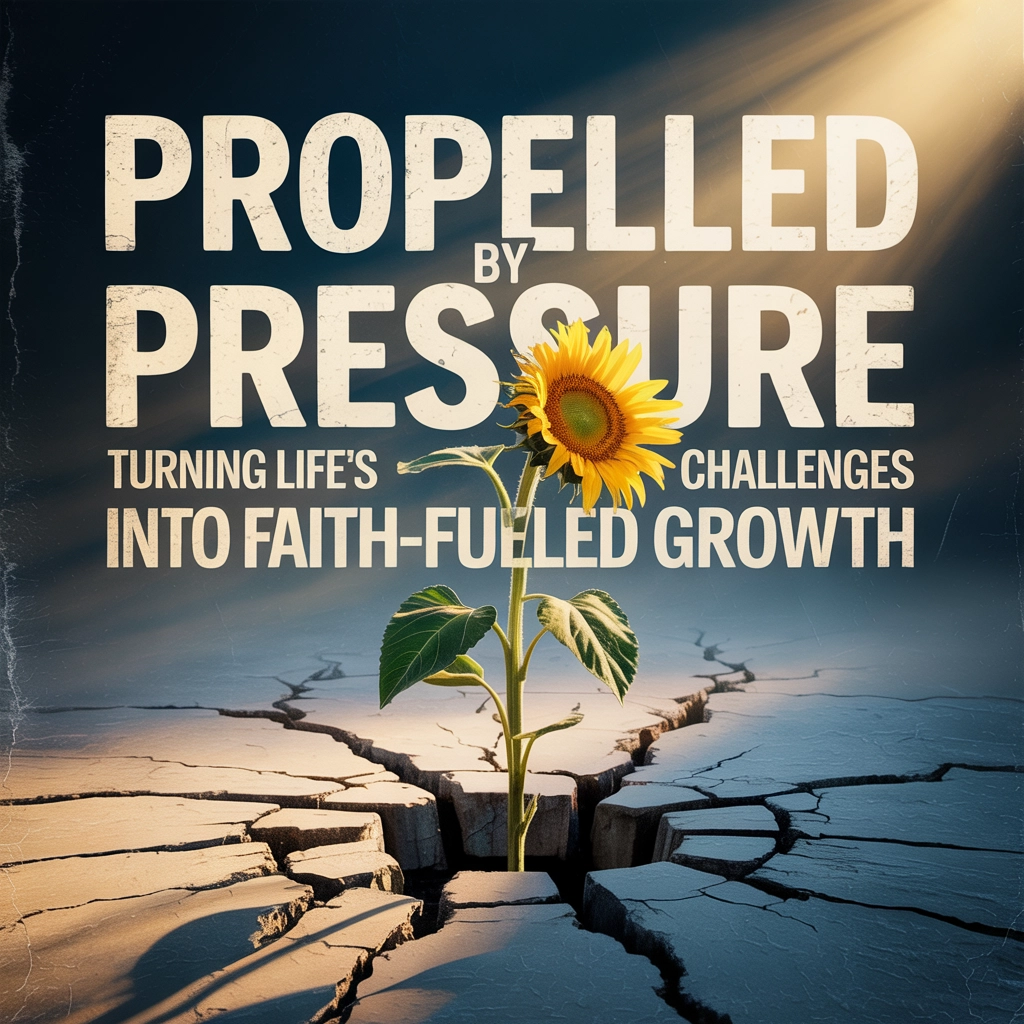
When "Whatever" Isn't Enough Anymore
Remember when adults worried the most rebellious thing about teens was their apathy? The eye rolls, the shrugs, the infamous "whatever" muttered under breath?
Something's changing. That same generation—the one labeled disinterested and digitally distracted—is now asking the biggest questions of all. And they're not satisfied with shallow answers.
I watched it happen last month at a youth group meeting. The leader had planned games and pizza, but instead found himself surrounded by teenagers asking about suffering, identity, and whether God actually cares about their specific lives. These weren't philosophical exercises. Their eyes held an urgency that said: I need to know. Now.
The Pressure Cooker of Adolescence
If you're raising, teaching, or mentoring a teenager right now, you know. The pressure they face isn't just about college applications or social status anymore. It's existential.
Every day, your teen navigates:
- A social media landscape that commodifies their attention and warps their self-image
- A culture that simultaneously says "you can be anything" and "you're never doing enough"
- Global uncertainties that make their future feel unstable
- An identity marketplace selling labels faster than they can try them on
And beneath it all thrums the deepest human question: Who am I, really?
No wonder 72% of teens report feeling overwhelmed by pressure. No wonder anxiety rates have doubled among this generation. The noise is deafening, and the answers they're getting don't satisfy the soul-level hunger they feel.
The Hidden Revival No One's Talking About
Here's what mainstream media isn't covering: Gen Z is experiencing a quiet spiritual awakening.
Recent research reveals something counterintuitive—77% of U.S. teens express genuine interest in learning more about Jesus. Even among non-Christians, curiosity about faith is rising. In the Netherlands, young people are flocking to Christian festivals. In France, youth baptisms are increasing. In the UK, young men are returning to church.

This isn't your parents' religious revival. It's happening in surprising spaces—TikTok accounts exploring biblical wisdom, underground worship gatherings, and late-night conversations in dorm rooms. It's messy and authentic. It's teens discovering that maybe—just maybe—ancient truth speaks to modern pressure.
As one 16-year-old told me: "I'm tired of being told to 'live my truth' when I don't even know what my truth is. I want something solid to stand on."
When Progress Happens Under Pressure
Pressure isn't always negative. Sometimes it's the very thing that transforms us.
Consider this: diamonds form only under extreme pressure. The most beautiful natural wonder in the world exists because carbon withstood crushing force. Without pressure, it would remain ordinary coal.
Your teenager's questions, doubts, and hunger for meaning aren't signs of spiritual weakness—they're evidence of transformation happening beneath the surface. The pressure they feel is producing something precious.
But here's where we often miss our opportunity as parents, mentors, and faith leaders: we try to remove the pressure instead of providing truth that helps them thrive within it.
The Power of Truth-Filled Moments
Gen Z doesn't need elaborate theological systems or perfect answers to every question. What they need are consistent reminders of bedrock truths that anchor their identity when everything else shifts.
Think about it this way: a teenager might hear 4,000 messages a day about who they are or should be. Most contradict each other. Most are trying to sell something. All of them together create white noise that drowns out their own thoughts.
But what if, in the midst of that noise, a simple truth breaks through? What if they encounter one clear statement about their value, purpose, or identity—not based on performance or appearance, but on something unchangeable?
That's when transformation happens. Not in grand revelations, but in small moments of clarity that accumulate over time.
This is why teens report that simple, tangible reminders make such a difference in their faith journey:
- A verse on their mirror that speaks to their specific struggle
- A conversation with a mentor who reflects God's truth back to them
- A prayer practice that grounds them in something beyond their feelings
- A physical reminder they can touch when digital overwhelm hits

Breaking Through the Noise Barrier
When a teen feels the pressure of conflicting messages, simple truth becomes revolutionary.
Consider Jenna, a high school junior who described herself as "drowning in expectations." Each morning, she'd wake up already feeling behind—behind on schoolwork, behind on social media, behind on figuring out her future. Anxiety had become her constant companion.
A youth leader noticed and gave her a simple card with words that spoke directly to her struggle: "You are already enough because I am enough in you." — God
"I put it on my nightstand," Jenna said. "It's the first thing I see every morning, and sometimes I just hold it and breathe before I look at my phone. It reminds me that no matter what happens today, my value doesn't change."
That's not just a nice story—it's neuroscience. When we're under stress, our brain's capacity for complex reasoning diminishes. We need clear, simple truths we can grasp and hold. We need reminders that bypass the cognitive overload and speak directly to our hearts.
The Method Behind the Moments
At FaithCardsCo, we've watched this phenomenon unfold thousands of times. Teens who find themselves drowning in the noise discover that simple, tactile reminders of God's truth become lifelines.
Here's why this approach resonates so powerfully with Gen Z:
- It meets digital natives in the physical world. In a generation where nearly everything is virtual, physical objects carry special significance. A truth you can touch feels more real.
- It provides pattern interruption. When negative thought spirals begin, a visible reminder creates a "pattern interrupt" that can redirect thinking.
- It speaks their language of authenticity. Gen Z values realness above almost everything. Simple, unfiltered truth resonates where polished messaging fails.
- It acknowledges pressure without minimizing it. Rather than suggesting teens should just "trust God and relax," truth-filled reminders acknowledge real pressure while providing perspective within it.
- It bridges the gap between head knowledge and heart belief. Many teens know biblical concepts intellectually but struggle to feel them emotionally. Tangible reminders help truth travel the 18 inches from head to heart.

Starting Points: Helping Teens Thrive Under Pressure
If you're walking alongside a teenager navigating these pressures, here are some practical ways to provide truth anchors:
1. Create truth touchpoints
Help them identify specific places (car dashboard, bathroom mirror, phone lock screen) where they'll see truth reminders daily. Our Teen Devotionals are specifically designed for this purpose.
2. Name the noise
Have honest conversations about the contradictory messages bombarding them. Simply naming the noise makes it less overwhelming.
3. Practice pressure perspective
When they're feeling crushed, remind them that pressure isn't just something to endure—it's creating something beautiful in them. Share stories of how pressure in your own life revealed strength you didn't know you had.
4. Provide identity language
Many teens struggle to find words for what they're experiencing. Give them language that connects their experience to God's perspective: "That feeling of not measuring up? That's the gap between human expectations and God's acceptance."
5. Create physical anchors
In moments of clarity and connection, create something tangible they can return to later. This might be a written prayer, a meaningful object, or a truth card that captured what they needed most.
The Truth That Changes Everything
So what is it that today's teens are truly hungry for? Not just information about God. Not just rules or religion.
They're hungry for identity truth that holds firm when everything else shifts under pressure.
They need to know they're seen. Known. Loved. Chosen. Not because of what they achieve, how they look, or who follows them—but because of who created them and who they belong to.
When a teen knows—really knows—that their identity is secure, they can face crushing pressure without being crushed. They can question without losing foundation. They can struggle without shame.
And that might be the most powerful truth of all: that progress doesn't happen in the absence of pressure, but right in the middle of it.
What simple truth does the teen in your life need to hear today? What pressure are they facing that could become the very thing that reveals their strength?
Sit with those questions. And remember—sometimes the simplest reminders make the deepest difference.
